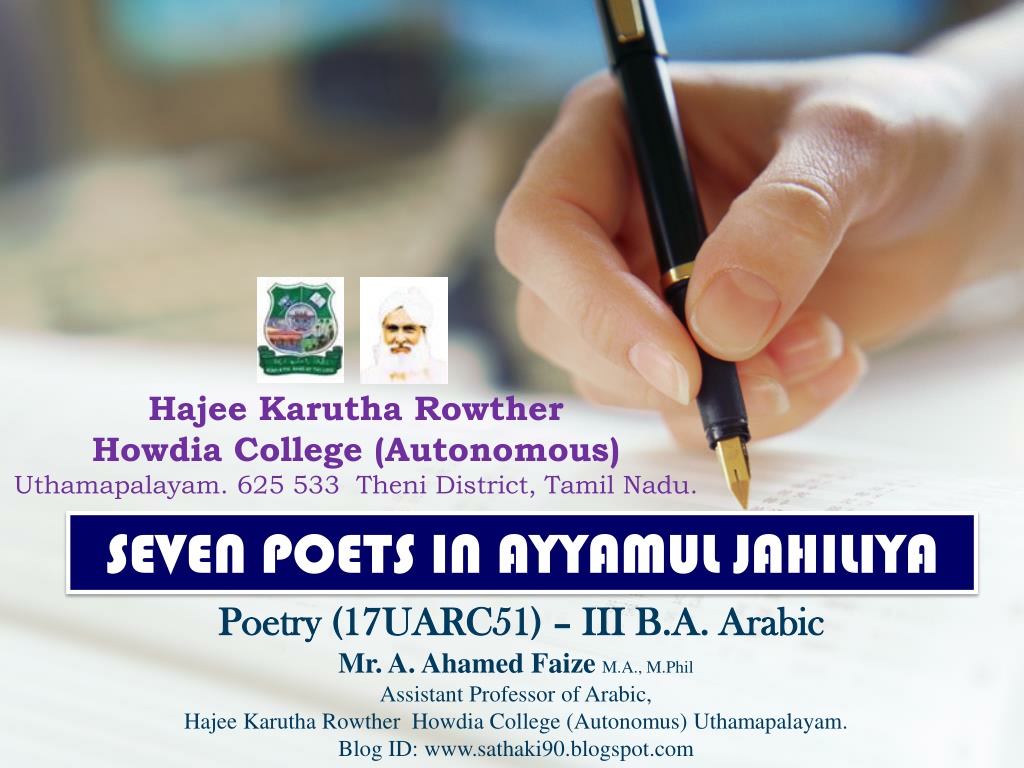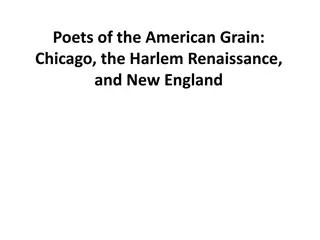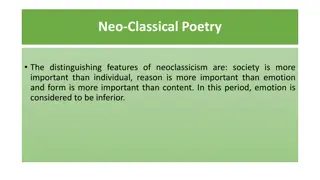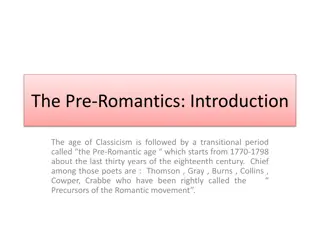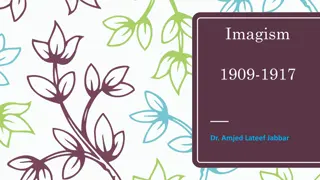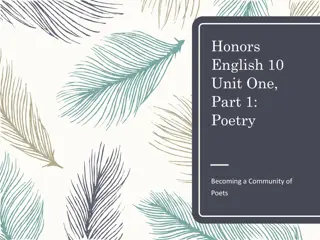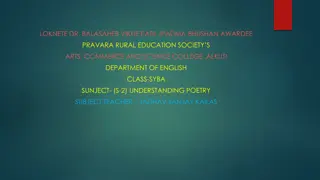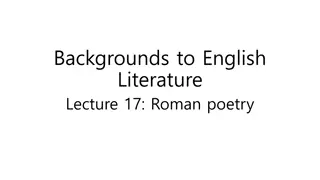Poetry and Poets of Ayyamul Jahiliya: Imru'al-Qais and Labd
Explore the rich heritage of Arabic poetry during the pre-Islamic era known as Al-Jahiliyya, focusing on the works of Imru'al-Qais and Labd. Immerse yourself in the captivating verses of Imru'al-Qais, considered a masterpiece of ancient Arabic literature, and delve into the life and poetry of Labd, a poet of the Bani Amir tribe. Discover the cultural significance and poetic excellence that emerged from the time of ignorance in the Arabian Peninsula.
Download Presentation

Please find below an Image/Link to download the presentation.
The content on the website is provided AS IS for your information and personal use only. It may not be sold, licensed, or shared on other websites without obtaining consent from the author. Download presentation by click this link. If you encounter any issues during the download, it is possible that the publisher has removed the file from their server.
E N D
Presentation Transcript
Hajee Karutha Rowther Howdia College (Autonomous) Uthamapalayam. 625 533 Theni District, Tamil Nadu. SEVEN POETS IN AYYAMUL JAHILIYA Poetry ( Poetry (17 17UARC UARC51 51) ) III B.A. Arabic Mr. A. Ahamed FaizeM.A., M.Phil Assistant Professor of Arabic, Hajee Karutha Rowther Howdia College (Autonomus) Uthamapalayam. Blog ID: www.sathaki90.blogspot.com III B.A. Arabic
Seven Poets in Ayyamul Jahiliya Imru' al-Qais Lab d Tarafah Zuhayr bin Abi Sulma Antarah ibn Shaddad Amr ibn Kulthum Harith ibn Hilliza
Imru' al-Qais The Muallaqa of the Pre-Islamic Arab poet Imru al Qays is his most important poem. It is considered by many to be one of the greatest masterpieces of ancient Arabic literature, or even of Arabic literature in general. It has been translated into English several times; the first translation was done by Sir William Jones in the 18th Century, and the most recent just a few years ago, by the Irish poet Desmond O'Grady. Yet in order to truly understand its significance, it is first necessary to first explain a little the background of the time and place in which it was written.
Imru' al-Qais The days before Islam are called in Arabic Al Jahiliyya, meaning the time of ignorance or barbarity. However, it is during this time that some of the greatest Arabic poetry was conceived - a fact recognised even by the Muslims themselves. In these days, the Arab Peninsula was divided among many small tribal territories and kingdoms, and in each tribe there was a poet, Sha'ir, who was second in importance only to the Sheikh, the head of the tribe. The poet was responsible for keeping the history and the genealogy of the tribe, and in his poems he glorified the tribe and mocked its enemies.
Labd He belonged to the Bani Amir, a division of the tribe of the Hawazin. In his younger years he was an active warrior, and his verse is largely concerned with inter-tribal disputes. Later, he was sent by a sick uncle to get a remedy from Muhammad at Medina and on this occasion was much influenced by a part of the Koran, shortest Surah, Al Kawthar. He accepted Islam soon after, but seems then to have ceased writing. In Umar s calipate he is said to have settled in Kufa. Tradition ascribes to him a long life, but dates given are uncertain and contradictory. One of his poems is contained in the Mu allaqat
Labd In an elegy composed for Nu'mh Mundhii, Labid wrote: Every thing, but Allah, is vain And all happiness, unconditionally, will vanish When a man is on a night journey, he thinks that he has accomplished some deed But man spends his life in hopes ... If you do not trust your self, approve it Perhaps the past would unclose it to you When you do not find a father other than 'Adnan and Ma'ad, The judge (God) will punish you On the day when every body will be informed of his deeds
Tarafah arafah ibn al- Abd ibn Sufy n ibn Sa d Ab Amr al-Bakr al-W il ), was a 6th century Arabian poet of the tribe of the Bakr. He is one of the seven poets of the most celebrated anthology of ancient Arabic poetry, known as the Muallakat, however just one of his poems is included. His fellow poets preserved in this work are Al Nabigha, Antarah ibn Shaddad, Zuhayr bin Abi Sulma, Alqama ibn Abada an arafah was the half- brother or nephew of the elegist AL Khirniq bint Badr. Tarafa's bitter tongue was destined to cost him dear. Fatigued and disgusted by the rigid ceremony of the court, he improvised a satire in which he said:- "Would that we had instead of 'Amr A milch-ewe bleating round our tent
Tarafah Amr b. Hind was a man of violent and implacable temper. Tarafa's satire had already been reported to him, and this new impertinence added fuel to his wrath. Sending for Tarafa and Mutalammis, he granted them leave to visit their homes, and gave to each of them a sealed letter addressed to the governor of Bahrayn. When they had passed outside the city the suspicions of Mutalammis were aroused. As neither he nor his companion could read, he handed his own letter to a boy of Hira and learned that it contained orders to bury him alive. Thereupon he flung the treacherous missive into the stream and implored Tarafa to do likewise. Tarafa refused to break the royal seal. He continued his journey to Bahrayn, where he was thrown into prison and executed
Zuhayr bin Abi Sulma Zuhayr bin Ab S lm also romanized as Zuhair or Zoheir, was a pre-Islamic Arabian poet who lived in the 6th & 7th centuries AD. He is considered one of the greatest writers of Arabic poetry in pre-Islamic times. Zuhayr belonged to the Banu Muzaina. His father was a poet and his elder son Ka'b bin Zuhayr also became a poet, reading his works to the Prophet Muhammad. Since 2007, the English Wikipedia page of Zuhayr bin Abi Sulma has received more than 49,001 page views. Her biography is available in 16 different languages on Wikipedia. Zuhayr bin Abi Sulma is the 2,710th most popular writer (down from 2,548th in 2019).
Antarah ibn Shaddad Antarah ibn Shadd d al- Abs ; AD 525 608), also known as Antar, was a pre Islamic Arab knight and poet, famous for both his poetry and his adventurous life. His chief poem forms part of the Muallaqat, the collection of seven "hanging odes" legendarily said to have been suspended in the Kaaba. The account of his life forms the basis of a long and extravagant romance. Antarah was born in Najd in Arabia. His father was Shadd d al- Abs , a respected warrior of the Banu Abs under their chief Zuhayr. His mother was an Ethiopianwoman named Zabeebah.She was a princess taken as a captive by his father as a slave during one of the tribe's raids against Axum. Described as an "Arab crow" (al-aghribah al-'Arab) owing to his dark complexion, Antarah grew up a slave as well.
Amr ibn Kulthum Amr ibn Kulthum Ibn Malik Ibn A`tab Abu Al-Aswad al- Taghlibi )was a poet and chieftain of the Taghlib tribe in pre- Islamic Arabia. One of his poems was included in the Muallaqat The great Basus war, which was between the Taghlibs and the Bakrs, lasted for approximately forty years until the Lakhmids king of al- Hirah, Amr ibn Hind, urged them to make peace with each other on condition that some of their children were to be taken hostages by the king. The King of Hira said one day to his drinking companions, "Do you know anyone among the Arabs whose mother declines serving my mother?" They replied, "Yes, Amr Ibn Kulthum." The king asked, "Why is that?" His companions replied, "Because her father is Al- Muhalhel Bin Rab 'ah, her uncle is Kolaib a prestigious Arabian, her spouse is Kulthum Ibn Malik Ibn Etab an astounding knight of Arabs and her son is Amr ibn Kulthum chief of his clan.
Harith ibn Hilliza Al- rith ibn illiza al-Yashkur pre-Islamic Arabian poet of the tribe of Bakr, from the 5th century. He was the author of one of the seven famous pre-Islamic poems known as the Mu'allaqat. Little is known of the details of his life. The story of the mu'allaqa which al-Harith composed is as follows. A dispute had arisen between the men of Taghlib and those of Bakr after a number of young Taghlib men had died in the desert. The men of Taghlib chose their prince, Amr ibn Kulthum, to plead their cause before Amr bin Hind, the king of al-Hirah in southern Iraq. Ibn Kulthum pleaded the Taghlib's cause by reciting the sixth of the mu'allaq t. A quarrel then broke out between Ibn Kulthum and al-Nu'man. was a
